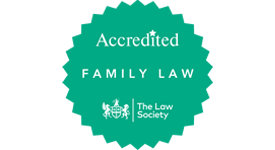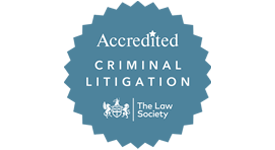We undertake private fee paying cases, no win no fees agreements as well as cases funded by the Legal Aid Agency for criminal and family matters.
Criminal Cases
The costs position of your case will differ depending on whether your case is privately funded, or whether you are entitled to receive legal aid in accordance with the Access to Justice Act 1999.
Applying for Legal Aid
Legal aid is not automatically granted. Anyone can apply for Legal Aid but to qualify you will need to show that your means are below a certain level and your matter falls within the scope of the types of cases that are funded by the Legal Aid Agency.
We can assist you in applying for Legal Aid to cover your case and will ask you to complete the application forms.
To calculate whether you qualify for legal aid on financial grounds, there is an online calculator at https://www.gov.uk/guidance/criminal-legal-aid-means-testing
The decision to award Legal Aid is made on the basis of both the details of your case (called the Interests of Justice Test) and the financial information you provide (called the Means Test). It is therefore very important that you complete the forms accurately and (where necessary) send evidence to support the information you provide. If any of this information supplied by you is false or misleading, your legal aid may be stopped, and you will have to fund your legal costs privately. Further, the Legal Aid Agency may prosecute which could lead to a prison sentence or fine.
Please note that if you are found guilty at the Magistrates’ Court, the court will often order you to pay a portion of the costs of the prosecution.
If your case proceeds to the Crown Court, you will again be asked to provide details about your income and savings and your financial situation will be assessed with one of the following outcomes:
You do not have to pay for the work that we do for you because you have been awarded Legal Aid to cover all your costs;
You have to pay a contribution towards our costs because you can afford to pay from your income, capital or both, or you have to pay privately for all the work that we do for you.
If you do not provide this evidence, your payments could be increased. If you do not tell the truth on your legal aid application about your income, assets and expenditure the Legal Aid Agency may prosecute which could lead to a prison sentence or fine.
Privately Funded Representation
If you have an annual disposable household income (after living costs and family circumstances such as a partner and/or any children are taken into account) of £37,500 or more, you will not be eligible for legal aid and you will have to pay privately.
If it is determined that you do not qualify for legal aid, OR if for whatever reason you choose to fund your case privately, you will be provided with details of our private charging rates. The cost of your case will be determined by the complexity of the matter, the volume of documentation, attendances upon you and any witnesses, the number of correspondence (including emails) and telephone calls made and received and Court hearings/ attendances.
Family Cases
Applying for Legal Aid
Legal Aid is available for some family matters. We will advise you on whether you are likely to be eligible for Legal Aid at the outset of your matter.
The rules on who is eligible to receive legal aid changed on the 1 April 2013.
You may be eligible for legal aid if either you or your child have been the victims of domestic violence AND are on a low income or in receipt of benefits
What family matters can I get legal aid for?
Legal aid is available for the following family issues:
- family mediation, to resolve disputes about children and finance on a relationship breakdown
- applications for a non-molestation order or occupation order;
- applications for a restraining order under the Protection from Harassment Act 1997;
- applications for a Child Arrangements Order, Prohibited Steps Order or Specific Issue Order, if you or your child have suffered or are at risk of suffering violence or abuse from the other party
- representation for children who are made party to private family law proceedings;
- applications for forced marriage protection orders;
- proceedings brought by the local authority for a care order or supervision order;
- cases where your child has been or is about to be taken out of the UK without your consent;
- exceptional cases, where the refusal of legal aid would infringe your rights under the European Convention on Human Rights (ECHR) or your EU rights to legal representation;
- applications for post-adoption contact under section 51A Adoption and Children Act 2002, either where there is evidence of domestic violence or child abuse or for a child who is party to the proceedings.
Financial means
Most family cases are means tested, you will therefore need to provide evidence to the legal aid agency that you cannot afford to pay your legal costs. In doing so, we will require you to provide us with information about your income, benefits, savings, property and shares.
For some cases you can get legal aid regardless of your financial means. Non-means tested legal aid is available if your child is subject of care or supervision proceedings commenced by the local authority.
To calculate whether you qualify for legal aid on financial grounds, there is an online calculator at www.gov.uk/checl-legal-aid.
Legal aid if you have been a victim of domestic violence or abuse.
You may be entitled to legal aid for private family law disputes (eg. Child Arrangements Order, Prohibited Steps Order or Specific Issue Order) if you have been a victim of domestic abuse or violence.
You will need to obtain evidence that shows you were or are at risk of being a victim of domestic abuse or violence from the other party in the case. The Legal Aid Agency has produced sample letters that you can use to request the evidence that you need, these letters can be accessed from www.gov.uk/government/collections/sample-letters-to-get-evidence-of-domestic-violence.
Regulation 33 of The Civil Legal Aid (Procedure) Regulations 2012 as amended by The Civil Legal Aid (Procedure) (Amendment) Regulations 2016 sets out the evidence needed to claim legal aid due to domestic abuse or violence. You can find a full list of updated evidence at https://assets.publishing.service.gov.uk/government/uploads/system/uploads/attachment_data/file/672143/evidence-requirements-private-family-law-matters-guidance-version-8.pdf
Our family team are experts in completing the necessary paperwork and helping you through the process of applying for Legal Aid.
Privately Funded Representation
If you do not qualify for Legal Aid for your family matter, we can represent you privately. Our fee earner’s private charging rates will be discussed with you prior to you instructing us to go ahead with your case. The level of costs will very much depend on the volume of documentation, attendances upon you and any witnesses, the number of correspondence (including emails) and telephone calls made and received and Court hearings/ attendances. We will give you a fee estimate at the outset which is an indicative estimate based on our fee rates, and our knowledge of the proposed work at that point. Estimates are given in good faith, but unless otherwise agreed, our fees may be higher or lower than estimates given. For instance, if significant further work is required in addition to that currently envisaged [or if the timetable is extended significantly], our fees will be greater than the indicative estimate. Should it become apparent at any time during the course of the matter that significant further work will be required or if any difficulties have arisen which might make an increase in our fees necessary, we let you know.
Fixed Fees
In some cases, we are able to provide a fixed fee which may include everything from start to finish or for a particular part of the work. Fixed fees can be given in the type of cases listed below:
- Pre-Nuptial Agreements
- Divorce
To comply with the Money Laundering Regulations of the UK, we will require all new clients to provide evidence of their identity and the provenance of any funds.
To contact our funding team, please phone our office on 0207 281 1001. You can also email us at enquiries@faradayssolicitors.co.uk.




